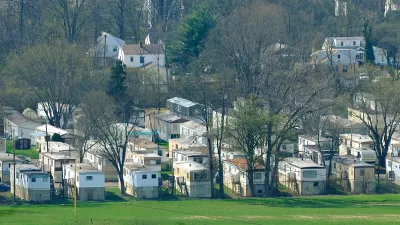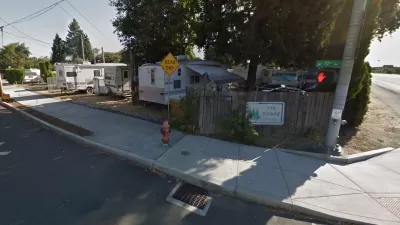Cities across America have a housing crisis on their hands—should they be talking more about trailer parks?

At CityLab, Carson Bear interviews preservationist and landscape architect Eduard Krakhmalnikov, who conducts research on mobile home parks and believes that they fill a “critical gap” in the housing market despite being increasingly endangered by rising land values in many American cities.
“We talk about affordable housing all the time as we should,” Krakhmalnikov tells Bear, “but we never talk about mobile homes or mobile home parks—even though they’re primarily used as affordable housing.”
The advantage of manufactured homes is also the reason they are at risk of extinction; it’s a much more affordable opportunity for homeownership, but the parks in which they are placed are usually privately owned and can therefore be sold.
And the reason they are increasingly valuable as a housing option is precisely what makes them more likely to be redeveloped: residential real estate prices are nearly at a crisis point (or actually at a crisis point) all over the country, and for the owners of mobile home parks, the temptation to sell at a premium is enormous. When they do sell, owners of mobile homes may or may not be able to find an alternative location.
The confluence of need and value has made mobile homes a topic of debate in many U.S. cities over the last several years.
For example, the city council in Aurora, Colorado recently voted for “a 10-month moratorium on rezoning applications for existing mobile home parks” to assess options for preserving affordable housing. In an effort to do just that, several other cities in Colorado have bought the mobile home parks to prevent redevelopment.
Other examples include Washington State, which has set aside some funds to purchase a park in SeaTac to avoid the eviction of those residents, though it may not be enough; Honolulu, which has incredibly high housing costs and has recently used mobile homes to provide housing to formerly homeless individuals and families; in Austin, planners are considering “anti-displacement zoning” that would preserve mobile home parks, among other affordable options; and in New Hampshire, among other places, in some parks residents have organized and bought the land collectively.
Krakhmalnikov suggests a more radical approach to historic preservation as another tool to keep parks from being sold off for redevelopment. “It would be exceptionally difficult to put them in the National Register, the way it’s set up now,” he tells Bear, “but that ultimately opens up opportunities for the future. I think we need to change the way we measure and create historic places.”
FULL STORY: The Case for Preserving Mobile Homes

Trump Administration Could Effectively End Housing Voucher Program
Federal officials are eyeing major cuts to the Section 8 program that helps millions of low-income households pay rent.

Planetizen Federal Action Tracker
A weekly monitor of how Trump’s orders and actions are impacting planners and planning in America.

Ken Jennings Launches Transit Web Series
The Jeopardy champ wants you to ride public transit.

NYC Open Streets Organizers Call for City Support
The number of open streets projects has dropped year after year as volunteer groups struggle to fund and staff them.

Crime Continues to Drop on Philly, San Francisco Transit Systems
SEPTA and BART both saw significant declines in violent crime in the first quarter of 2025.

How South LA Green Spaces Power Community Health and Hope
Green spaces like South L.A. Wetlands Park are helping South Los Angeles residents promote healthy lifestyles, build community, and advocate for improvements that reflect local needs in historically underserved neighborhoods.
Urban Design for Planners 1: Software Tools
This six-course series explores essential urban design concepts using open source software and equips planners with the tools they need to participate fully in the urban design process.
Planning for Universal Design
Learn the tools for implementing Universal Design in planning regulations.
Heyer Gruel & Associates PA
Ada County Highway District
Institute for Housing and Urban Development Studies (IHS)
City of Grandview
Harvard GSD Executive Education
Toledo-Lucas County Plan Commissions
Salt Lake City
NYU Wagner Graduate School of Public Service





























